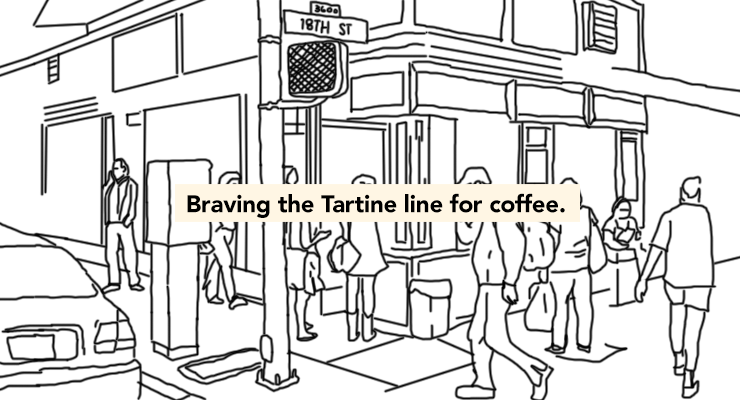
For the entire time I’ve lived in San Francisco, I have done so within a short walk’s distance from the now-legendary Tartine Bakery. Chad Robertson’s little bakery has established itself as a go-to spot for San Francisco locals, bridge-and-tunnel lookie-loos and, of course, swarms of continental and intercontinental tourists, intent on sampling their delectable assortment of pastries and loaves. And with the fame and adoration came what Tartine has perhaps become even better known for: a staggeringly long line. I enjoy Tartine; I’ve spent more than a few mornings on some nearby stoop, cramming my face with a morning bun. I have certainly spent an evening with a bottle of wine and a few friends, slowly drinking my way towards sunset, anticipating said morning bun.
Yet, even as a professed fan of their wares, I have never once, not even for a single second, desired a pepper-flecked gougère enough to think about braving that line. Hell, I mocked the line, whittled away whole conversations insulting it, conjecturing how the mass of non-locals’ seemingly constant presence and growth was just another announcement that The Mission I knew and loved was coming, had come, to an end. But never did I make the decision to stand, like a cotton-candy-drunk fair-goer waiting for a roller coaster, in that line.
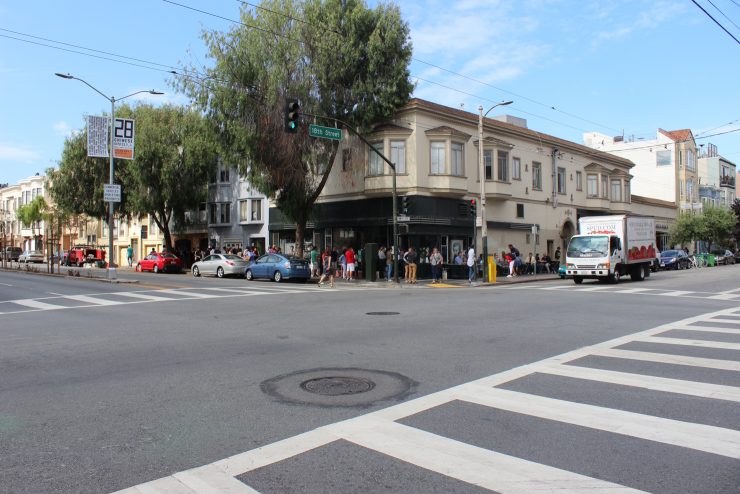
Recently, Oakland-born Blue Bottle and its ever-expanding coffee empire announced that it had purchased Tartine. Blue Bottle cafes across the world would now stock their cleanly lit pastry cases with an assortment of Tartine’s goods and, Tartine would, after many years with Mr. Espresso and then Four Barrel, switch to serving Blue Bottle. And with the switch comes all of Blue Bottle’s coffee-making procedures—most importantly, their edict that all drip coffee be prepared through the at times agonizingly slow pour-over process.
Now, for a food service establishment already endowed with a line like Tartine’s—one hundred feet long, two to three folks wide—throttling back to pour-over as your sole method for brewing drip coffee is a risky move. Blue Bottle’s cafes have been notorious for long lines and slow service, which are often blamed on the company’s insistence on slow-dripped coffee. Add that to an internationally known crowded croissant line and…what could go wrong?
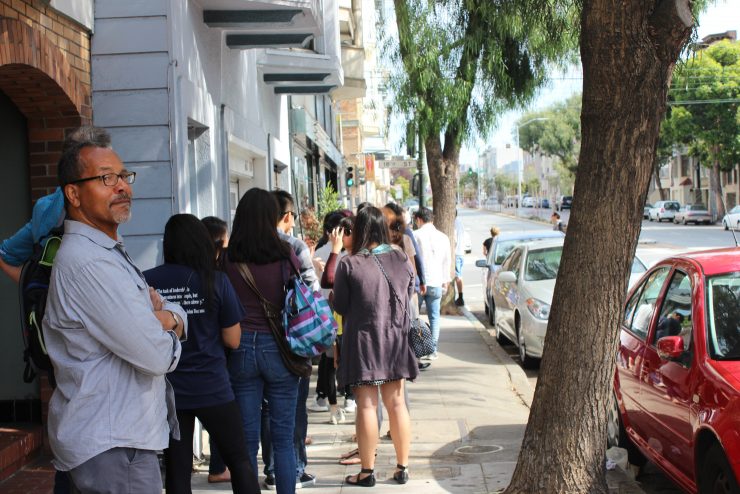
Following the announced switch, a barista at a local coffee spot informed me that, as predicted, the switch to pour-over had not only added to the length of the line, but to the slowness and the confusion of it. Tartine serves its coffee separately from its pastries—in a sort of kiosk-within-a-cafe—but now with people waiting five to ten minutes at a time for their pour-over, the pastry line was merging with the newly minted coffee line forming a morass of inefficiency I would need to see to believe. Exactly what happens when the finicky apex of specialty coffee meets the king of all lines? I knew I would have to do with the Tartine line what I’d always avoided—I’d have to wait in it.
I decide to meet my photographer Michael Light in front of Tartine at 10:00 on a Sunday morning, what I’ve been told is the “ground zero” for Tartine’s massive line. It lives up to expectation. When I arrive at 9:50, the line crawls out of the front door, past the storefront, and fifteen or so feet further. The store’s been open for less than an hour and I estimate 60 people already waiting outside, not counting the lucky ones wedged into the actual space itself.
I take a deep breath, hit the timer on my phone, and step into line behind a trio of twenty-something women. It’s a diverse line, not all tourists or folks who might’ve wandered in from The Marina—there’s a couple of solo regulars (the New York Times tucked under their arms) and some parents struggling to manage strollers on the small wisp of sidewalk. It looks, from the outside, communal—the kind of line you might experience waiting for a midnight show of the new Star Wars flick, where people might even strike up conversations about their excitement over what’s to come. But this is 2015 and everyone either has a friend or a smart phone, and these people are here not for random social interaction. Joiners of the Tartine Line are here on a mission—pastries.
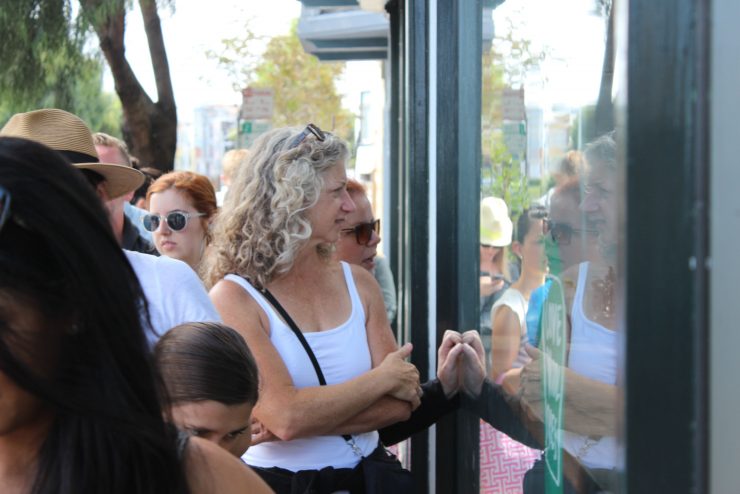
Though it turns out, as I learn from Light, customers seeking coffee only (but why?) have been able to skip the pastry line, and just grab coffee from the baristas, paying promptly as they do so. But we learn later that this “cheat” is slowly being phased out—the idea seemingly being that customers just looking for some coffee, might be tempted to grab a pastry if tantalized in front of the case for a long enough time. Regardless, we’re here for the whole Tartine experience, so we settle into the line and, well, we wait.
And wait, and wait—the line snaking out of this well-established bakery moves at a sluggish pace. Every few plodding steps, I check my timer and then look back behind me where the line has continued to fill out. From this vantage point, the line looks even longer than before, and at one point, I don’t know if we’ve moved at all, or if the line’s growth behind us has just changed my perspective and we’re still standing in the same place. Surprisingly, it’s not an angry line—these folks aren’t shocked or surprised to be sacrificing hours of their life for a slice of toast, nope, these people have arrived fully in the know, and they wait in relative, if not unruly, peace. We’re on the West Coast, after all.
We hit the front door of Tartine at 10:30, almost 35 minutes after we got in the line, and get our first glance inside, what I assumed would be the madness of the interior, and it’s, well, kind of empty. Sure the line—a little more single-file, a little more constrained—is still there, pressed up against the window to the left peering out on to customers filing in behind us, before creeping its way in front of the glowing pastry case and then up to the register. But the cafe itself, particularly the coffee area, looks a little abandoned. A few of the tables have families or large groups gathered around the remains of their meal, but there’s plenty of tables, and aside from the bottleneck of comers and goers at the front door and the line, it doesn’t feel very chaotic. Service isn’t being slowed by customers gumming up the works looking for a table, because there are plenty of open tables. Which begs the question, again: why did we just wait in line for 30 minutes?
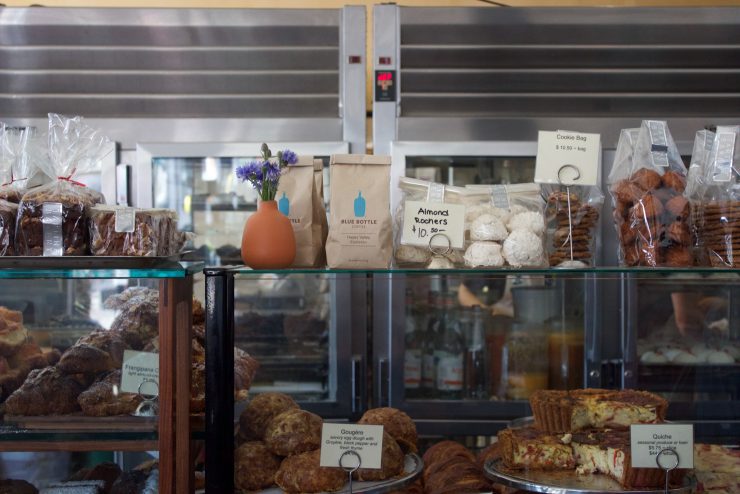
Being in line on the inside of the Tartine might be the most excruciating part of the whole process. You’re in the bakery, in full view—and aroma—of the glut of pastry wealth, but somehow the line seems to get even slower. You can grab a menu at this point to really clarify what you’re going to order once your time comes, but why would you? The pastries are all right there in front of you, begging to be chosen. And once you’re inside, you can finally realize why the line is so long, and it isn’t just customers or just employees—it’s the combination. The customers, regardless of the fact that they’ve had almost an hour (it’s 55 minutes on the timer before we have pastries in hand) to decide what they want, are deer caught in the headlights when asked, by Tartine’s uniformly friendly staff, what they’re having. Even though everything they could ever want is displayed directly in front of them at this point, they stammer and hedge, unsure of their selection. Indecision seems to be the worst of the problems, but there are also questions (Is there anything gluten free? Does this have nuts? Do you take AMEX?) and language barrier issues, and people wanting not that, but that, morning bun. Each moment of slowness is like someone squeezing their brakes in a traffic jam—little ripples of slowness that inevitably coalesce into The Line of Lines.
Some of the blame, though, lies with the proprietors. Tartine is, on purpose or not, a slow-moving beast. There’s a moment near the end of the line where I’m just standing—staring at mounds of croissants, anticipation building—where I can see three or even four employees just standing behind the glass, not moving, not reaching out to see if customers need anything. I’m sure they’re doing something that I, hungry and tired, am totally oblivious to, but after slogging through a line for an hour, I want to reach across the glass and grab them, make them pay attention to me. Aside from that, Tartine hasn’t ever tweaked any part of their service process to encourage a speedier outcome. From my hour spent in the line, I can see slow points (why do you only get a menu when you’re inside? How come no one comes out from behind the counter to take orders?) but maybe, just maybe, Tartine likes the line. Maybe, and I’m not unveiling some new, shocking theory here, maybe the idea of a gaggle of people queued up outside your place of business being, well, good for business is just what Tartine is looking for.
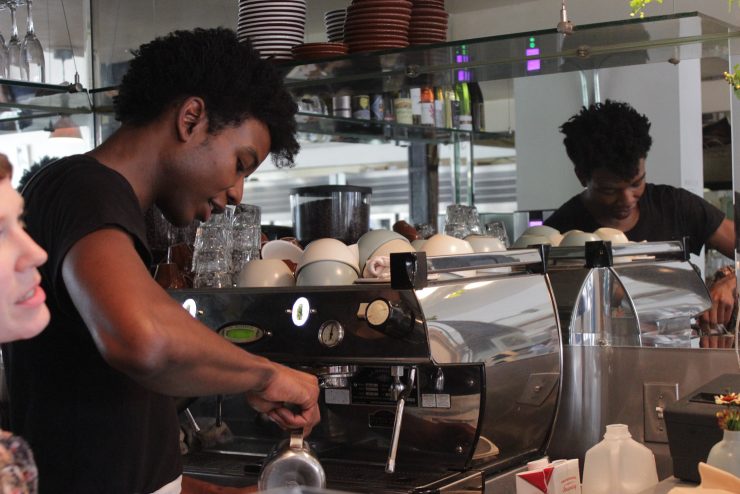
And then, like a miracle, someone is asking Light and I what we want, and suddenly we’re at the register, and then, with grace and ease, we’ve put down our orders for a pour-over and an Americano to go, and, with brown paper pastry bags in our hands, we’re out of the crush of the line, and waiting, almost entirely by ourselves in the coffee area. I assumed, because of the advent of the pour-over, that this would just be another chapter of line waiting, a sort of cruel coda on the whole experience, but, strangely it isn’t. We are the only people waiting for coffee, and it’s a quick, painless wait punctuated by very friendly baristas.
We wait for five or so minutes while the pour-over drips. I ask if the vibe has changed since Blue Bottle took over (a little) and express my surprise that there isn’t a tangle of folks, elbows out, trying to get a drink. At this, the barista slyly smiles, shakes her head a little, “You should’ve been here twenty minutes ago,” she says, “there were 15 Japanese tourists who each ordered 2 pour-overs.” She motions down the measly four pour-over setup on the counter, and says, “It got pretty slow.” As if on cue, my pour-over finishes just as Light’s Americano comes off the machine—a perfectly timed delivery of a coffee we have, in some way or another, been waiting an hour for.
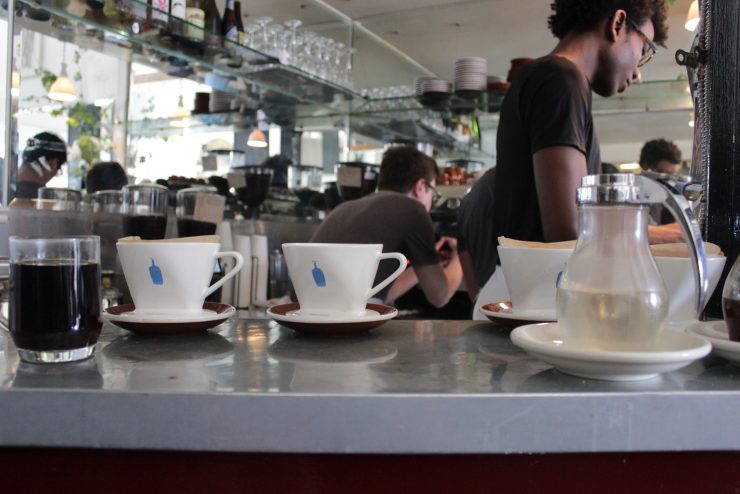
Outside, our coffees in hand, we take a gander at the line still spewing forth from Tartine. It’s almost 11:30 now, and the sun is up, and The Mission is awake, and line-waiters shuffle about trying to get out of the way of people just walking on the sidewalk. I’ve got a chocolate croissant in one hand and my pour-over in the other, but, for whatever reason, I’m somehow not as hungry anymore.
Tartine is, unequivocally, a lovely place to get a pastry and a cup of coffee. It feels homey and very much a part of The Mission, and, to a tee, the pastries, bread, and coffee live up to expectations. Now, does it need some help in getting the line moving a little faster on a Sunday morning? Undoubtedly. Do they want it? Probably not. And for me, after waiting an hour and change for a $4 croissant and a cup of coffee, do I think it’s worth it? Maybe I’ll get back in line…give myself some more time to think on that.
Noah Sanders (@sandersnoah) is a Sprudge.com staff writer based in San Francisco, and a contributor to SF Weekly, Side One Track One, and The Bold Italic. Read more Noah Sanders on Sprudge.
Photos by Michael Light for Sprudge.
The post In San Francisco, Braving The Tartine Line For Coffee appeared first on Sprudge.

